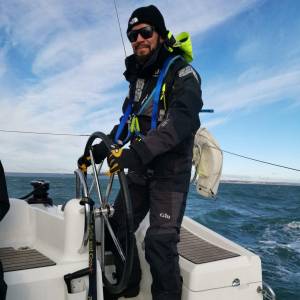
RYA Coastal Skipper is for advancing skippering techniques for sailors with considerable knowledge of sailing and navigation, wanting to undertake coastal passages by day and night. The course consists of skippered passages in a variety of situations. You will skipper more challenging passages and learn more about passage planning, pilotage by day and night, boat handling, safety and emergency situations.
Book on a RYA Coastal Skipper Sail course Below. Future dates are available, please contact the office for details.
Price: £800
Previous Experience: 15 days, 2 days as skipper, 300 miles, 8 night hours
Assumed Knowledge: Navigation to Coastal/Yachtmaster Theory level and boat handling to Day Skipper level
Duration: 5 Days
Location: Turnchapel Wharf, Plymouth, Devon, UK
Course Content:
- Passage Planning & Pilotage
- Preparation for Sea
- Boat Handling under sail & Power
- Emergency Situations
- Adverse Weather Conditions
- Skippering
Costs include accommodation, all meals whilst onboard (if as a group you opt to dine out one night, this will be at your own expense), mooring fees, use of waterproofs if required.
Optional Extra:
- G158 RYA Logbook – available to buy from the office
Weather on Courses: When training on our vessels, we are always subject to environmental conditions. Some courses can be more affected than others. We are based in Plymouth, therefore we are subject to the vagaries of British weather. On any given week or weekend, we can have no wind, too much wind, fog, too much sun, snow – sometimes they all happen on the same day….
On sailing courses wind is the key issue. Therefore there is a rare chance that you may not sail every day. If we can sail safely, we will. In high winds, luckily, Plymouth is a very sheltered harbour from most wind directions, therefore we can often get to shelter and then sail in those areas within our very large harbour and rivers. Please also bear in mind that if we cannot sail, we will cover theory subjects as all RYA practical courses still have approximately 30% theory in the course which we normally break up into chunks throughout the week/weekend, but we may save them for the windy/no wind/foggy times.
In extremes: There are also those weekends or weeks when the weather is simply diabolical and we get a week of Force 9-10’s when we may just call and stop the course, usually beforehand if it is well forecast. More often than not we get a day or so of poor weather and work around it.
All courses: On all courses our aim is to complete the course in the safest way possible, covering all the theory and practical elements. We are not able to guarantee courses will have practical sessions on every day as we will work around the weather forecast
What’s Next?
